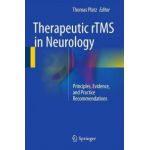Therapeutic rTMS in Neurology: Principles, Evidence, and Practice Recommendations

Preț: 612,00 lei
Disponibilitate: la comandă (vezi secțiunea "Despre livrare")
Autor: Thomas Platz
ISBN: 9783319257198
Editura: Springer
Anul publicării: 2016
Pagini: 203
DESCRIERE
This comprehensive reference on therapeutic repetitive transcranial magnetic stimulation (rTMS) documents the current status in the field. The main focus is the clinical applications of rTMS tested to date, including treatment of paresis, aphasia, and visual neglect in stroke patients, therapy for motor impairment in Parkinson's disease, and applications for tinnitus and neuropathic pain. Based on the available clinical evidence (RCTs, meta-analyses, and systematic reviews), combined with the personal experience of experts, a clinically oriented best evidence synthesis is provided for each application, together with a clear description of rTMS algorithms that generate clinical benefits in the target domain. A further feature is the presentation of a theoretical model of therapeutic action for each therapeutic target. The book will be invaluable for clinicians and researchers in neurology and related fields, including neurologists, physiatrists, as well as ENT and pain specialists.
Neurophysiology of rTMS.- Brain imaging - network effects of rTMS.- Basic principles of rTMS in motor recovery after stroke.- Clinical applications of rTMS in motor rehabilitaton after stroke.- rTMS in dysphagia after stroke.- Basic principles of rTMS in aphasia treatment after stroke.- Therapeutic applications of rTMS for aphasia after stroke.- rTMS in visual neglect after stroke.- Clinical applications of rTMS in Parkinson's disease.- rTMS in the treatment of neuropathic pain.- Therapeutic applications of rTMS for tinnitus.- General concepts of therapeutic rTMS in neurology.
Thomas Platz teaches as professor for neurorehabilitation at the Ernst-Moritz-Arndt University Greifswald, Germany and is medical director of the BDH-Klinik there with its neurorehabilitation centre and spinal cord injury unit. His main scientific interest is recovery of function after brain damage. He leads the guideline committee of the German Neurorehabilitation Society (DGNR) and the educational committee of the World Federation of Neurorehabilitation (WFNR).
Accesul clienţilor
-Top 10
-Cărţi noi
-- 344,25 leiPRP: 382,50 lei
- 1505,52 leiPRP: 1672,80 lei
- 546,21 leiPRP: 606,90 lei
Promoţii
-- 280,00 leiPRP: 350,00 lei
- 29,25 leiPRP: 45,00 lei
- 29,25 leiPRP: 45,00 lei








RECENZII